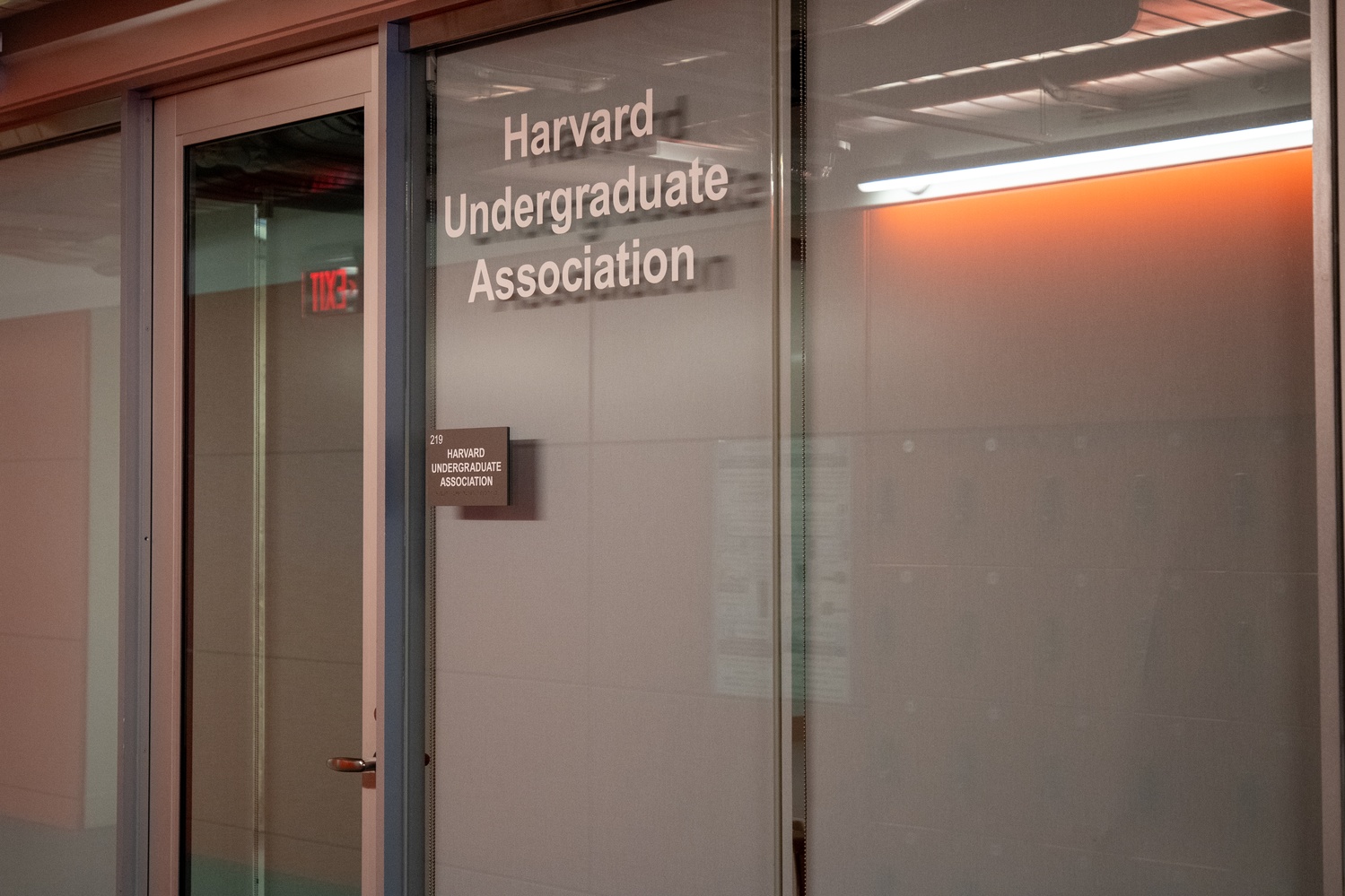
News
Summers Will Not Finish Semester of Teaching as Harvard Investigates Epstein Ties

News
Harvard College Students Report Favoring Divestment from Israel in HUA Survey

News
‘He Should Resign’: Harvard Undergrads Take Hard Line Against Summers Over Epstein Scandal

News
Harvard To Launch New Investigation Into Epstein’s Ties to Summers, Other University Affiliates

News
Harvard Students To Vote on Divestment From Israel in Inaugural HUA Election Survey
5 HUA Presidential Tickets Debate Student Issues to Nearly Empty Audience

Just hours before voting opened for the Harvard Undergraduate Association elections, 10 candidates vying for the co-presidency went head to head in a sparsely attended debate hosted by the Harvard Political Review.
The event featured five presidential campaigns: Hamza T. Masoud ’26 and Avery G.D Pratt ’26, Tsion A. Daniel ’27 and Sahil Sood ’27, Abdullah S. Sial ’27 and Caleb N. Thompson ’27, Sophia F. He ’27 and Malachi C. Miller ’27, and Omosefe I. Noruwa ’27 and Matthew R. Tobin ’27.
Chase M. Bourbon ’27 and Nathan R. Westbrook ’27, who pulled out of the race since their candidacy was announced to students on Friday, were not in attendance. Around 20 audience members attended the debate, which was held in Emerson Hall.
The debate was moderated by HPR staff members Ella V. Ricketts ’28 and Kaitlyn Vu ’27, who posed questions about club funding and diversity and inclusion before a period for questions submitted by the audience.
Sial and Thompson, who have been running on the platform that the HUA should not be the “administration’s mouthpiece,” stood out during the debate for their proposal to amend the HUA constitution to enable it “to take a position” on issues affecting Harvard College students.
The pair emphasized their desire to create a Harvard where students are not afraid to openly voice their opinions, pointing to current uncertainties for international Harvard students under the second Trump administration.
“It’s about students feeling scared to speak their minds when your international neighbors are scared that something might happen, when you’re scared about people around you who could be arrested at any point,” Sial said, mentioning that he is an international student from Pakistan.
“We solve this by having a constitutional amendment that allows the HUA to take a position on issues,” he said.
When asked what they believe is the biggest problem facing student life at Harvard, other candidates pointed to residential life and advocacy.
“There’s a disconnect between the HUA and what the students actually want, and that’s where the critical paradigm shift comes,” Sood said. “What Tsion and I are trying to champion is an ability in which there’s more touchpoints with administration between people on the HUA, between students, and between admin members themselves.”
While several pairs promised large-scale changes during the debate — like adding hot breakfast in House dining halls and adding Harvard IDs to mobile phones — Tobin and Noruwa distanced themselves from what they deemed unrealistic goals.
“Someone who’s telling you that they’re going to make HUDS better is lying to you. The HUA does not have a magic wand that can do that,” Tobin said. “What we can do is advocacy.”
“Although we can’t promise free laundry or free printing, we do think that creating subsidies with the extra money we can generate will be very substantial and very profound for students’ living experiences, even if it’s stuff like having extra detergent in laundry rooms or just advocating for free printing,” Noruwa said.
Despite the debate’s low attendance, Masoud and Pratt earned lively applause and laughter from the audience as they pitched an unconventional leadership style.
“You asked for the one biggest problem, but I can think of five biggest problems — and their names are Monday, Tuesday, Wednesday, Thursday, and Friday,” Masoud said, referring to the pair’s campaign promise of “more weekends.”
“And also public health,” Pratt added.
The moderators also asked each pair what sets their campaign apart despite several “similar platforms.”
He and Miller distinguished their campaign by highlighting their “passion for service.”
“We met at RTOC. We’re both literally willing to lay our lives down for our country and for what we believe in — imagine what we’d do for students at Harvard,” Miller said.
Some of He and Miller’s proposals aimed at improving student mental health included continuing to provide Uber vouchers for related off-campus appointments and hosting events with puppies.
“I think that puppies are the reason that I wake up in the morning,” He said.
Meanwhile, Tobin and Noruwa argued that their campaign is unique because it’s built on “accomplishable specifics.”
“We will allocate 90 percent of the HUA fundings to clubs to increase how much clubs get,” Tobin said. “We will subsidize textbooks, laundry, and printing for the students, and we will continue the advocacy that we’ve been doing.”
The debate, which lasted less than an hour in total, ended with each ticket presenting one-minute closing remarks.
“I think, simply put, we’re pushing boundaries,” Pratt said.
Voting for HUA co-presidents and other elected positions — like co-treasurers and officers for the Social Life, Academic, and Residential Life Teams — will close at 10 a.m. on Friday.
Clarification: April 12, 2025
A previous version of this article stated that Abdullah Shahid Sial ’27 and Caleb N. Thompson ’27 called for the Harvard Undergraduate Association to adopt an amendment allowing it to “take a position” on political issues. To clarify, Sial and Thompson have said they believe the HUA should be able to take positions on issues affecting student life — including the revocation of student visas, lack of access to recess housing for international students, and course registration timing — but should not adopt stances on external political issues that divide the student body.
—Staff writer Nina A. Ejindu can be reached at nina.ejindu@thecrimson.com. Follow her on X @nina_ejindu.
—Staff writer Claire L. Simon can be reached at claire.simon@thecrimson.com. Follow her on X @ClaireSimon.
Want to keep up with breaking news? Subscribe to our email newsletter.
